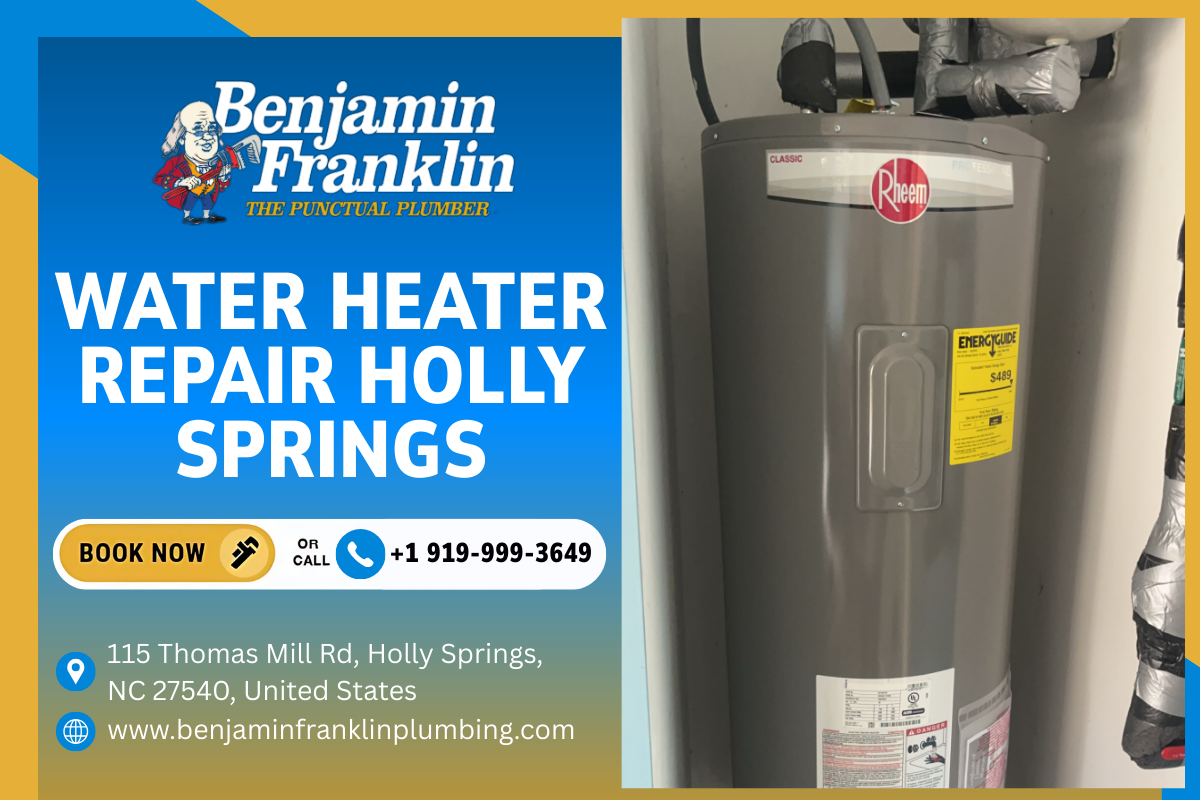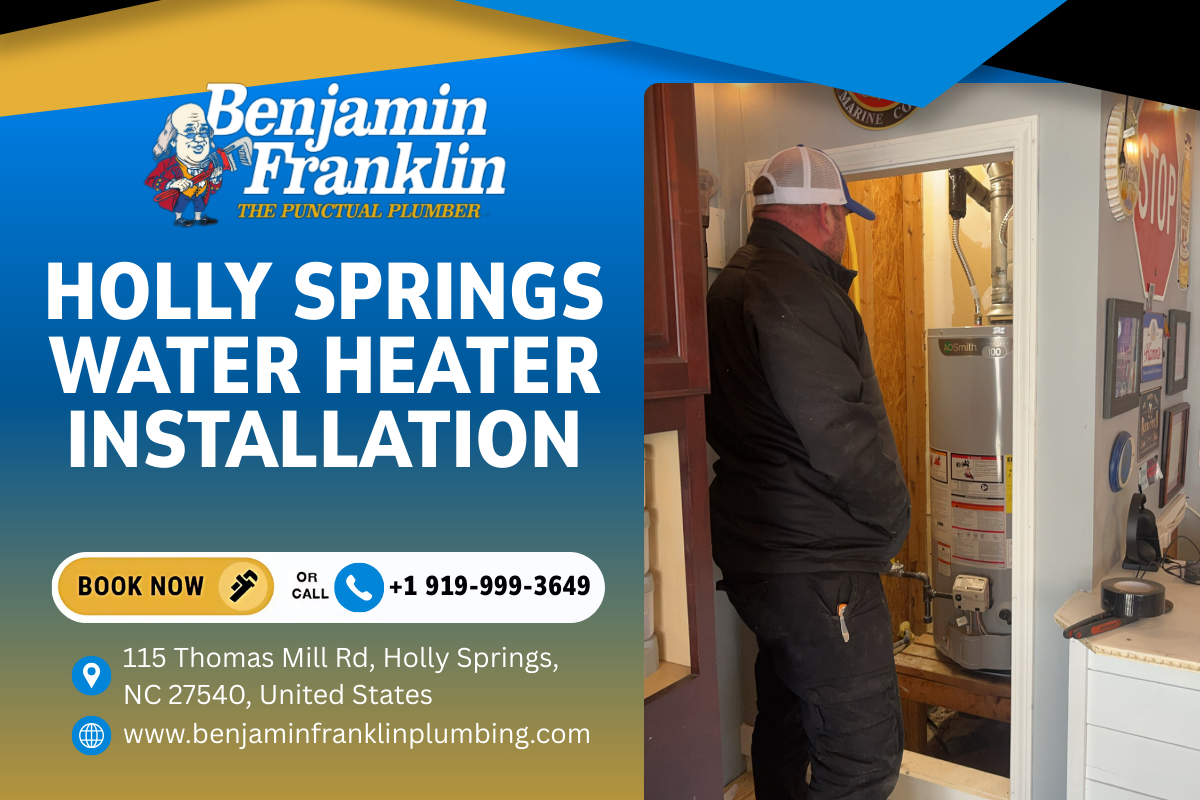
When to Consider Water Heater Replacement: A Guide for Holly Springs Homeowners

Introduction
In the quiet, picturesque town of Holly Springs, North Carolina, water heaters play a crucial role in ensuring our homes remain comfortable and functional. Whether you're washing dishes, taking a shower, or doing laundry, having reliable hot water is essential. But what happens when your trusty water heater starts showing signs of aging? At what point should you consider a water heater replacement? In this comprehensive guide, we will explore the indicators that signal it's time for a replacement, the various types of water heaters available today, and much more.
When to Consider Water Heater Replacement: A Guide for Holly Springs Homeowners
As a homeowner in Holly Springs, understanding when to replace your water heater can save you from unexpected inconveniences and costly repairs. Water heaters typically have a lifespan of 8-12 years. However, several factors can influence their durability and performance. Here’s an in-depth look at the key signs to watch for:
1. Age of Your Water Heater
The first thing to consider is the age of your unit. If your water heater is approaching or has surpassed its expected lifespan, it’s time to start thinking about replacement.
Understanding Lifespan
- Traditional tank water heaters generally last 8-12 years.
- Tankless models have a longer lifespan but still require periodic maintenance.
Note: Even if your unit isn’t leaking or malfunctioning, older models are less efficient and may increase energy bills.
2. Frequent Repairs
If you find yourself calling for water heater repair services more often than usual, this is a clear indicator that something’s not right.
Signs You Need Repairs:
- Unusual noises (popping or rumbling)
- Inconsistent temperatures
- Leaks around the base
Conclusion: Frequent repairs often indicate that replacement might be more cost-effective in the long run.
3. Rusty or Discolored Water
Have you noticed rusty or discolored water coming from your taps? This could indicate corrosion within the tank.
What This Means:
- Rust can compromise the integrity of the tank.
- It’s often a sign that your unit is nearing the end of its life.
Tip: Flushing out sediments annually can help maintain quality; however, if discoloration persists after flushing, consider replacement.
4. Leaks Around the Unit
Water pooling around your water heater is never a good sign. Even small leaks can escalate into severe problems.
Common Causes of Leaks:
- Corrosion
- Loose connections
- Damage due to temperature changes
Action Step: If you notice leaks, consult with a professional immediately to assess whether repair or replacement is necessary.
5. Higher Energy Bills
If you've noticed an unexplained spike in your energy bills, it might be time to evaluate your water heater's efficiency.
Inefficiency Indicators:
- The unit runs longer than usual to heat water.
- Older units may have higher operational costs compared to newer models.
Recommendation: Upgrading to an energy-efficient model could lead to significant savings over time.
6. Insufficient Hot Water Supply
Is there never enough hot water during peak usage times? This could indicate that your current system no longer meets your household's demands.
Possible Solutions:
- Evaluate whether you need a larger tank.
- Consider switching to a tankless system for on-demand hot water.
7. Strange Noises Coming from Your Heater
Unusual noises like banging or popping sounds emerging from your heater can be alarming and indicative of underlying issues such as sediment buildup.
What These Sounds Indicate:
- Sediment hardening at the bottom of the tank.
- Potential damage leading up to leaks or total failure.
Action Plan: Schedule regular maintenance checks with professionals specializing in water heater service and repair.
8. Continuous Temperature Fluctuations
Experiencing fluctuating temperatures while using hot water isn't just irritating; it's also an indicator that there may be issues with heating elements or thermostats inside the unit.
Considerations for Replacement:
- A new model may offer better temperature stability.
Tip: Regular maintenance can help mitigate some temperature inconsistencies before resorting to replacement.
9. The Type of Fuel Source Used by Your Water Heater
Older models might use less efficient fuel sources which could be replaced with modern alternatives like electricity or gas powered units that are more efficient and environmentally friendly.
Benefits of Modern Fuel Sources:
- Improved efficiency ratings
- Lower overall costs
Conclusion: Evaluating fuel sources during replacement discussions can help ensure you're making an informed choice about operational costs moving forward.
10. Available Space for New Installations
Before deciding on a new model type—especially if considering tankless options—ensure you have adequate space available in your home for installation purposes without compromising other systems' functionality like plumbing and electrical setups.
Space Considerations Include:
- Room dimensions
- Ventilation requirements
Types of Water Heaters Available
Understanding different types available on today's market helps inform decisions regarding potential replacements:
11. Traditional Tank Water Heaters
These conventional units store hot water in large tanks until needed by users throughout their homes—typically ranging from 20–80 gallons capacity depending upon household size requirements paired with usage patterns over timeframes!
Pros:
- Lower initial cost
- Simple installation process
Cons:
- Limited hot-water supply
- Higher energy consumption
12. Tankless Water Heaters
Also known as "on-demand" systems these utilize advanced heating techniques allowing instantaneous access without preheating stored reserves!
Benefits:
- Unlimited hot-water supply
- Energy-efficient operation
Choosing Between Electric vs Gas Models
Homeowners face essential decisions when evaluating electric versus gas-powered systems during replacements:
13. Electric Water Heaters
Electric options rely solely upon electricity rather than combustion fuels making them ideal choices where natural gas isn’t available!
Advantages:
- Easier installation process
- Generally safer (no combustion risks)
14. Gas-Powered Water Heaters
Gas-powered models provide quicker heating times compared against electric counterparts while often being cheaper than electric alternatives based on local utility pricing structures!
Maintenance Tips for Longevity
To tankless water heater repair ensure optimal performance levels throughout their respective lifespans homeowners must prioritize regular maintenance practices tailored towards prolonging functionality!
15. Regular Flushes & Cleaning Cycles
Sediment builds up within tanks over time leading towards inefficiencies! Conduct yearly flushes using specialized tools/systems designed specifically for effective cleaning cycles!
The Importance of Professional Installation Services
Hiring professionals ensures proper sizing/installations alongside compliance with local codes/regulations safeguarding both safety measures established within residential properties alike!
Cost Factors Associated with Replacement
Understanding potential costs involved enables budgeting effectively while navigating financial decisions surrounding replacements responsibly! Factors influencing expenses include:
Materials Used For Installations
Quality materials significantly impact price points.
Frequently Asked Questions (FAQs)
Here are some common questions homeowners have regarding their water heaters:
How do I know if I need a new water heater?
If you experience leaks, rust-colored water, strange sounds from your unit or frequent repairs it may signal it's time for replacement!
What type should I choose?
Evaluate lifestyle needs alongside energy efficiency preferences before selecting either traditional tank systems versus modern tankless designs best suited toward meeting specific family requirements!
Can I install it myself?
While DIY installations appear appealing hiring seasoned professionals ensures adherence towards safety standards along local regulations preventing future issues down roadways!
How long does installation take?
Most installations complete within one day depending on factors such as existing setup complexity alongside chosen equipment specifics involved throughout processes undertaken accordingly!
Are there warranties available?
Many manufacturers offer warranties ranging between six months up through twelve years providing peace-of-mind surrounding future repairs/replacements along product longevity assurances offered accordingly!
6. What should I do if my unit breaks down unexpectedly?
Always contact professional services immediately assessing whether immediate repairs suffice instead full replacements needed based upon conditions presented therein!
Conclusion
Deciding when it's appropriate to invest in water heater replacement requires careful consideration alongside thorough evaluations regarding performance indicators encountered across daily life experiences! By recognizing warning signs early homeowners prevent further complications while ensuring continued access towards consistent hot-water supplies throughout residences located within beautiful Holly Springs communities alike! Always remember investing wisely upfront leads towards lasting benefits enjoyed far beyond individual installations experienced today thus prioritizing comfort levels sustainably moving forward into future years ahead!
Benjamin Franklin Plumbing
Address: 115 Thomas Mill Rd, Holly Springs, NC 27540, United States
Phone: (919) 999-3649
Website: https://www.benjaminfranklinplumbing.com/hollysprings-nc/